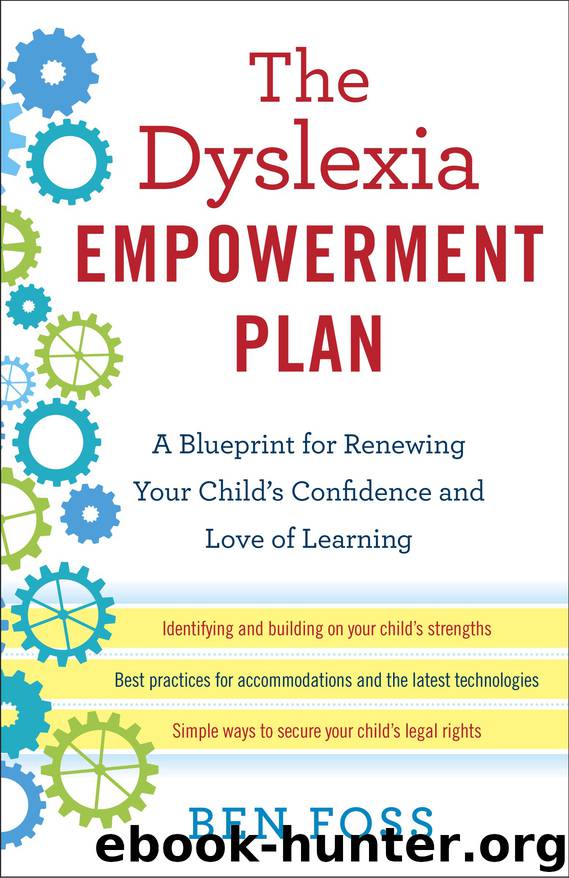The Dyslexia Empowerment Plan by Ben Foss

Author:Ben Foss
Language: eng
Format: epub
Publisher: Random House Publishing Group
Published: 2016-05-16T16:00:00+00:00
TEACHING YOUR CHILD TO BE HIS OR HER OWN ADVOCATE
Before I was able to express my frustration about my dyslexia, sometimes it came out in unproductive ways at school. One day when my father came to pick me up he was asked to visit with a learning specialist. I was in fourth grade and had been going to a separate room for one-on-one help for an hour a day for a number of years. The specialist explained that she had been working with me on writing out words by hand. She had written a word on a green chalk easel and asked me to copy it. In a fit of rage I rushed the chalkboard and flipped it up in the air, yelling and having a tantrum. She had not called my father in to ask that I be punished; rather, she wanted him to know that I was having real trouble at school and was frustrated.
Other days I would come home from school furious. This might have been because a teacher gave me a low mark on a spelling test, or another student taunted me for being sent out of class to special ed. So my mother and I made a deal. When I came home from school I could destroy anything in my room, as long as I dealt with the consequences. I was not allowed to destroy things outside my room (in the car, at the dinner table, etc.). On one particularly frustrating day, I came home and decided to open up the window and throw my new stereo out onto the pavement. Result: I blew off a lot of steam, and I no longer had a stereo.
My mother’s insight here was that she allowed me space to vent my anger. My mother and I have discussed some serious errors she made here. She effectively sent me to my room when I was angry. She has told me she wished she had stayed with me when I was raging, helping me understand I would not be shamed for being angry. We have healed this rift, and you should avoid sending your child away. It is also a good idea to set limits on how violent a child can get, teaching them to express their anger with words and in non-damaging ways. As an adult I learned to speak up in situations in which I was frustrated. But as a kid I didn’t have that poise.
You want your child to be able to talk through his frustration and, more important, to develop the skills involved in telling his own story. It is essential that he learn how to be a strong self-advocate because you will not always be with him when he needs to have these conversations, and it will allow him to feel confident about who he is and thereby break the cycle of shame. Advocacy starts at home around daily choices. What does he want for breakfast? What does he want to wear? Allow your child to have his opinions and make decisions about his own life.
Download
This site does not store any files on its server. We only index and link to content provided by other sites. Please contact the content providers to delete copyright contents if any and email us, we'll remove relevant links or contents immediately.
The Art of Coaching Workbook by Elena Aguilar(51202)
Trainspotting by Irvine Welsh(21669)
Twilight of the Idols With the Antichrist and Ecce Homo by Friedrich Nietzsche(18635)
Fangirl by Rainbow Rowell(9254)
Periodization Training for Sports by Tudor Bompa(8274)
Change Your Questions, Change Your Life by Marilee Adams(7783)
This Is How You Lose Her by Junot Diaz(6889)
Asking the Right Questions: A Guide to Critical Thinking by M. Neil Browne & Stuart M. Keeley(5776)
Grit by Angela Duckworth(5615)
Red Sparrow by Jason Matthews(5476)
Paper Towns by Green John(5191)
Room 212 by Kate Stewart(5125)
Ken Follett - World without end by Ken Follett(4735)
Housekeeping by Marilynne Robinson(4449)
The Sports Rules Book by Human Kinetics(4389)
Papillon (English) by Henri Charrière(4275)
Double Down (Diary of a Wimpy Kid Book 11) by Jeff Kinney(4273)
The Motorcycle Diaries by Ernesto Che Guevara(4103)
Exercise Technique Manual for Resistance Training by National Strength & Conditioning Association(4073)
